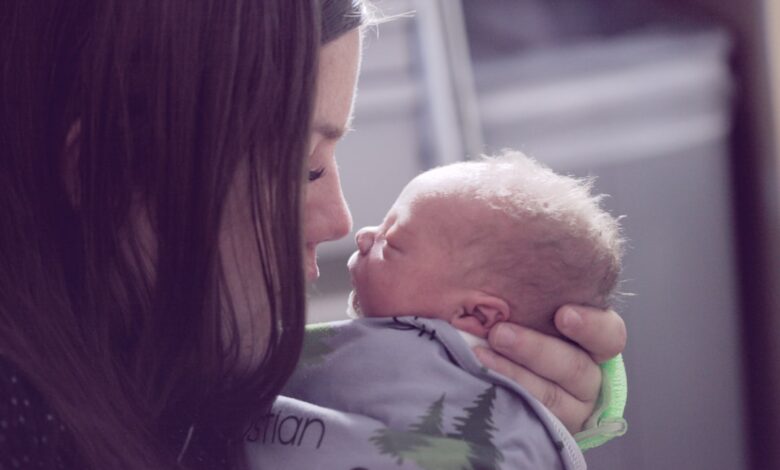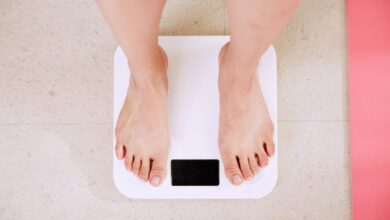Dropped 12 Kilos After Pregnancy Using This Simple Trick!

Hey there, new moms! First off, congratulations on your little one! Bringing a baby into the world is an amazing experience, but let’s be real – it also brings some changes to your body. I’m Sarah, and like many of you, I struggled with the post-pregnancy weight. I know how frustrating it can be to feel like you’re not in your own skin anymore. After trying a bunch of different things, I finally found a simple trick that helped me drop 12 kilos – and I’m excited to share it with you!
Now, before we dive in, let me be clear: every body is different. What worked for me might not work exactly the same for you. Always talk to your doctor before starting any new diet or exercise program, especially after giving birth. Your health and your baby’s health are the top priorities.

My Post-Pregnancy Weight Loss Journey
After my daughter was born, I felt so much pressure to “bounce back.” I saw all these celebrities looking amazing just weeks after giving birth, and I wondered what I was doing wrong. I tried fad diets, intense workout routines (which I definitely wasn’t ready for), and everything in between. None of it seemed sustainable, and honestly, it just made me feel worse. I was tired, stressed, and constantly hungry.
Then, I stumbled upon something that actually made a difference – mindful eating. It’s not a quick fix or a magic pill, but it’s a simple shift in mindset that can have a huge impact on your weight loss journey.
The Simple Trick: Mindful Eating
So, what exactly is mindful eating? It’s about paying attention to your food and your body while you’re eating. It’s about being present in the moment and savoring each bite. It’s the core thing that helped me lose those 12 kilos after pregnancy!
Here’s how to practice mindful eating:
1. Slow Down: We live in a fast-paced world, and we often rush through our meals without even realizing it. Try to slow down and take your time while you’re eating. Put your fork down between bites and really focus on chewing your food thoroughly. This gives your brain time to register that you’re full.
2. Eliminate Distractions: Turn off the TV, put away your phone, and find a quiet place to eat. When you’re distracted, you’re less likely to pay attention to your body’s hunger cues, and you’re more likely to overeat. Trust me, that Instagram scroll can wait!
3. Pay Attention to Your Senses: Before you even take a bite, take a moment to appreciate the look, smell, and texture of your food. Notice the colors, the aromas, and the way it feels in your mouth. Really savor each bite and pay attention to the flavors.
4. Listen to Your Body: Pay attention to your body’s hunger and fullness cues. Eat when you’re hungry, and stop when you’re satisfied, not stuffed. It takes practice to learn to distinguish between true hunger and emotional eating, but it’s a skill that will serve you well for life.
5. Be Kind to Yourself: Mindful eating is not about perfection. It’s about progress. There will be times when you slip up and overeat, and that’s okay. Just acknowledge it, learn from it, and move on. Don’t beat yourself up over it.
Why Mindful Eating Works
Mindful eating isn’t just a trendy concept; it’s backed by science. Studies have shown that it can help with weight loss, reduce stress, and improve overall well-being. Here’s why it works:
Improved Digestion: When you slow down and chew your food thoroughly, you’re giving your digestive system a head start. This can help prevent bloating, gas, and other digestive issues.
Better Portion Control: Mindful eating helps you become more aware of your body’s hunger and fullness cues, which can lead to better portion control. You’re less likely to overeat when you’re paying attention to your body.
Reduced Emotional Eating: Many of us turn to food for comfort when we’re feeling stressed, sad, or bored. Mindful eating can help you become more aware of your emotional eating triggers and find healthier ways to cope with your emotions.
Increased Satisfaction: When you savor each bite and pay attention to the flavors of your food, you’re more likely to feel satisfied with less. This can help you reduce your overall calorie intake without feeling deprived.
Beyond Mindful Eating: Other Helpful Tips
While mindful eating was the key for me, it’s also important to incorporate other healthy habits into your lifestyle:
Stay Hydrated: Drinking plenty of water is essential for overall health and can also help with weight loss. Aim for at least eight glasses of water a day.
Get Enough Sleep: Sleep deprivation can wreak havoc on your hormones and lead to increased cravings and weight gain. Aim for 7-8 hours of sleep per night.
Move Your Body: Exercise is important for both physical and mental health. Find an activity that you enjoy and make it a part of your routine. Even a brisk walk can make a difference.
Eat a Balanced Diet: Focus on eating whole, unprocessed foods like fruits, vegetables, lean protein, and whole grains. Limit your intake of sugary drinks, processed snacks, and unhealthy fats.
Be Patient: Weight loss takes time, so don’t get discouraged if you don’t see results overnight. Focus on making small, sustainable changes to your lifestyle, and the weight will eventually come off.
Safety First: Important Considerations
Remember, your body has just gone through a major transformation. It’s crucial to be gentle with yourself and prioritize your health above all else.
Consult Your Doctor: Always talk to your doctor before starting any new diet or exercise program, especially after giving birth. They can help you determine what’s safe and appropriate for you.
Don’t Restrict Calories Too Severely: Cutting calories too drastically can be harmful, especially if you’re breastfeeding. Aim for a moderate calorie deficit and focus on eating nutrient-rich foods.
Listen to Your Body: Pay attention to your body’s signals and rest when you need to. Don’t push yourself too hard, especially in the early postpartum period.
Alternatives to Mindful Eating
While mindful eating worked wonders for me, there are other approaches you could explore as well. These include:
Intermittent Fasting: This involves cycling between periods of eating and fasting. Some women find it helpful for weight loss, but it’s not for everyone, especially those who are breastfeeding.
Low-Carb Diets: Reducing your carbohydrate intake can lead to weight loss, but it’s important to make sure you’re still getting enough nutrients. Talk to your doctor or a registered dietitian before starting a low-carb diet.
Weight Watchers/Other Programs: Structured programs like Weight Watchers can provide support and accountability, which can be helpful for some people. However, they may not be sustainable in the long term.
Frequently Asked Questions (FAQ)
Is mindful eating just for weight loss?
No, mindful eating has benefits beyond weight loss, including reduced stress, improved digestion, and increased overall well-being.
How long does it take to see results with mindful eating?
It varies from person to person. Some people see results within a few weeks, while others may take longer. Be patient and consistent with your practice.
Is mindful eating safe for breastfeeding mothers?
Yes, mindful eating is generally safe for breastfeeding mothers, as long as you’re not restricting calories too severely. It’s important to eat a nutrient-rich diet to support both your health and your baby’s health. Always consult your doctor or a registered dietitian for personalized advice.
What if I slip up and overeat?
It happens! Don’t beat yourself up about it. Just acknowledge it, learn from it, and move on. Mindful eating is about progress, not perfection.
Can I combine mindful eating with exercise?
Absolutely! Exercise is a great way to support your weight loss efforts and improve your overall health. Find an activity that you enjoy and make it a part of your routine.
So, that’s my story and my simple trick! Mindful eating helped me lose 12 kilos after pregnancy, and I truly believe it can help you too. Remember to be patient with yourself, listen to your body, and focus on making sustainable changes to your lifestyle. You’ve got this, mama! And don’t forget to consult with your doctor before starting any new diet or exercise program. Good luck on your post-pregnancy journey!
Related Posts
| Postpartum Moms: Here’S How To Reduce Weight Quickly |
| How I Lost My Belly Fat After Baby Without Gym! |
| Struggling After Pregnancy? Try This Easy Weight Loss Method |



